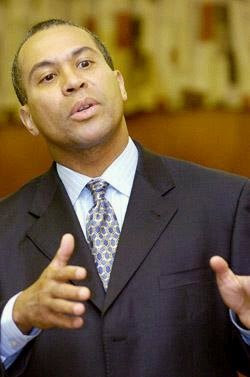 Sun Ra The Jazz Mystic
Sun Ra The Jazz MysticFamous Jazz Musician Choses Path of Enlightenment Over Golden Child...
Patrick Shaped By Father's Absence
By Sally Jacobs, Globe Staff March 25, 2007
It was supposed to be Deval Patrick's day of triumph.
He was 18 years old and his family was gathered in the crowded Milton Academy gymnasium on a rainy summer morning in 1974 to watch him graduate. Suddenly, his father, who had largely abandoned the family 15 years earlier and had seen his son rarely, showed up unexpectedly. Deval was not happy to see him.
Patrick's family -- his mother, grandparents, and sister -- sat though the ceremony rigid with tension, angrily eyeing Pat Patrick at the end of the row. And then as they all drove in his grandfather's Buick toward a restaurant to celebrate, his parents began to fight. They screamed at each other, and curses flew. Patrick senior, an emotional man who had opposed his son's attending the elite private school, broke into tears.
Through it all, Deval sat quietly in the front seat. When the car stopped at a light he got out, slammed the door, and stamped back to his dorm.
"It was a disaster," the governor recalled in an interview in his State House office. "I am thinking, this is supposed to be my day. . . . I just bailed."
Over the course of a career that would take him from Milton to the governor's office, Deval Patrick has said little about his father. Nor has he been asked much about him. It has been a very private corner of a most public life.
But in fact, he had a complex relationship with his father, one that would ebb and flow over the years, ultimately shaping in part the man Deval Patrick is today.
As a child, he knew his father largely by his eloquent absence. Laurdine "Pat" Patrick, a gifted baritone saxophone player who traveled the world with the legendary Sun Ra Arkestra and a host of jazz greats, was often on the road. As he grew into adulthood, Deval would confront and ultimately come to know the passionate, often mischievous man who was his father. By the time Pat Patrick died of leukemia in 1991, the two men had found a certain peace.
Deval's experience of his father, as he sees it, motivated him "to be a better man than in some ways I think my father was as a father and as a person in relationship to his wife." But some family members speak of something more than that: They believe it galvanized him and taught him to rely, from a very early age, on his own judgment and ability. And it all began, in a way, when he chose to attend Milton Academy despite his father's stern opposition to a school so identified, in his mind, with the white power structure.
"If anything about my father helped shape the man who Deval is now maybe it is that he was rebelling against his father in doing what he has done with his life," said Rhonda Sigh, the governor's older sister. "I think everything he has done since then has been a way of saying: "I don't need your approval. I can do this on my own.' "
His parents' marriage ends, and the family struggles on
The end came with a phone call. It was 1959 on the South Side of Chicago and Emily Patrick, Deval's mother, answered the telephone. A woman on the other end was asking for her husband, Pat. Emily did not recognize the caller.
"He's not here," Emily said, as Deval recounts it. "Can I take a message?"
The message was this: "Tell him our baby needs shoes."
"He's not here," Emily said, as Deval recounts it. "Can I take a message?"
The message was this: "Tell him our baby needs shoes."
When Pat Patrick returned to his furious wife that evening, the marriage was over. Pat left home that night. He would not see Deval and Rhonda, then ages 4 and 5 respectively, for more than a year. Emily struggled to make it on her own, working at a dry cleaners and taking welfare for a while, before moving into a two-bedroom apartment with her parents. She and the children shared a set of bunk beds in one room. Not having a father around was hard for them all, but hardly unique in the neighborhood.
"There were a number of other families who were headed by women, like ours, so the model was not unfamiliar," recalled Deval.
Emily's anger at her husband simmered for years, but she went out of her way to cultivate a relationship between her children and their father. She encouraged them to write him letters. When he passed through town on a gig or to visit his mother once or twice a year, little Deval and Rhonda were dressed and ready for an outing. And every now and then, at Pat's urging, she dropped them off to play at the home of their half sister, La'Shon Anthony, who lived with her maternal grandparents in Chicago.
"I knew their mother knew about my mother," said Anthony, 47, a self-employed consultant in Chicago. "But whether the two of them ever saw each other face to face I don't know. It was not my place to ask."




No comments:
Post a Comment